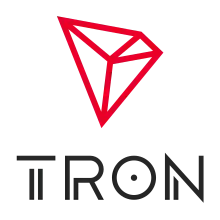TRON (cryptocurrency)
TRON is a Blockchain-based decentralized operating system based on a cryptocurrency native to the system, known as TRX.

History
TRON was founded by Justin Sun in 2017.[1] TRON Foundation raised $70 million in 2017 through an Initial coin offering shortly before China outlawed the digital tokens.[2]
The white paper of TRON was accused of plagiarism.[3] Researchers from Digital Asset Research (DAR) have discovered multiple instances of code copied from other projects in the Tron code base. It is also accused of violating the GNU Lesser General Public License v3.0 (LGPL) because the project does not mention that its client, Java-Tron, was derived from EthereumJ. These accusations were denied by the TRON Foundation, the organization behind the design of the system.[4]
In 2018, TRON switched its protocol from an ERC-20 token on top of Ethereum to an independent peer-to-peer network. After that, marketed to rival Ethereum. On 25 July 2018, the TRON Foundation announced it had finished the acquisition of Bittorrent, the biggest peer-to-peer file sharing network.[5] Upon this acquisition, in August 2018, BitTorrent Founder Bram Cohen also disclosed that he was leaving the company to found Chia, an alternative to bitcoin created to be a less energy-intensive cryptocurrency.[6]
By January 2019, TRON had a total market cap of about $1.6 billion.[7] Despite this market performance, some authors viewed TRON as a typical case of the complex and disordered nature of cryptocurrencies.[8][9] In February 2019, after being acquired by Tron Foundation, BitTorrent started its own token sale based on the TRON network.[10][11]
In May, 2019, the cyber-security testing service HackerOne revealed[12] that just one computer could have brought TRON’s entire blockchain to a halt.[13] The revelation showed that a barrage of requests sent by a single PC could be used to squeeze the power of the blockchain's CPU, overload the memory, and perform a distributed denial-of-service (DDoS) attack.[14]
Architecture
The TRON protocol, maintained primarily by the TRON Foundation, distributes computing resources equally among TRX holders with internal pricing mechanisms such as bandwidth and energy.[15] TRON provides a decentralized virtual machine, which can execute a program using an international network of public nodes. The network has zero transaction fees and conducts ~2000 transactions per second.
The implementations of TRON foster minimal transaction fees to prevent malicious users to perform DDoS attacks for free. In this respect, EOS.IO and TRON are quite similar, due to the nonexistent fee, high transactions per second and high reliability, and regarded as new generation of blockchain system.[16] Some researchers defined TRON as an Ethereum clone, with no fundamental differences.[17] The transactions per second rate on Tron's blockchain was questioned because it was far below its theoretical claim.[18]
References
- EST, Jack Moore On 1/20/18 at 9:56 AM (2018-01-20). "What Is Tron? Cryptocurrency's budding founder wants to change the internet". Newsweek. Retrieved 2019-09-01.
- "This coin issuer is all cashed up amid China's ban, but is it all hype?". South China Morning Post. 2018-07-31. Retrieved 2019-08-26.
- Brown, Mike. "Is Tron Plagiarized? White Paper Controversy Hits Cryptocurrency". Inverse. Retrieved 2019-08-24.
- Bailey, Jonathan (2018-02-01). "The Multi-Billion Dollar Plagiarism Scandal". Plagiarism Today. Retrieved 2019-09-01.
- "Blockchain startup Tron closes BitTorrent acquisition". TechCrunch. Retrieved 2019-08-20.
- Beedham, Matthew (2018-08-20). "BitTorrent inventor walks away after TRON acquisition". Hard Fork | The Next Web. Retrieved 2019-08-20.
- "The Hottest Cryptocurrency, Tron, Rekindles Memories of the Bitcoin Bubble". www.bloomberg.com. Retrieved 2019-09-01.
- Stosic, Darko; Stosic, Dusan; Ludermir, Teresa B.; Stosic, Tatijana (2019-07-01). "Exploring disorder and complexity in the cryptocurrency space". Physica A: Statistical Mechanics and Its Applications. 525: 548–556. Bibcode:2019PhyA..525..548S. doi:10.1016/j.physa.2019.03.091. ISSN 0378-4371.
- Poyser, Obryan (2018-06-29). "Herding behavior in cryptocurrency markets". arXiv:1806.11348v2 [q-fin.ST].
- Clark, Bryan (2019-01-03). "BitTorrent just launched a TRON-based cryptocurrency token". Hard Fork | The Next Web. Retrieved 2019-08-26.
- "BitTorrent unveils cryptocurrency so users can pay for faster download times". VentureBeat. 2019-01-03. Retrieved 2019-09-01.
- "Tron Foundation disclosed on HackerOne: DOS attack by consuming all..." HackerOne. Retrieved 2019-08-31.
- Canellis, David (2019-05-06). "TRON suffered from a critical bug that could've crashed its entire blockchain". Hard Fork | The Next Web. Retrieved 2019-08-31.
- Osborne, Charlie. "TRON critical security flaw could break the entire blockchain". ZDNet. Retrieved 2019-08-31.
- Dimaz Ankaa Wijaya, Joseph Liu, Ron Steinfeld, Dongxi Liu, and Limerlina, 'Senarai: A Sustainable Public Blockchain-Based Permanent Storage Protocol', in Cryptology and Network Security 18th International Conference, CANS 2019, Fuzhou, China, October 25–27, 2019, Proceedings, ed. by Yi Mu, Robert Deng, Xinyi Huang (Springer, 2019), pp. 235-46.
- Valdeolmillos, Diego; Mezquita, Yeray; González-Briones, Alfonso; Prieto, Javier; Corchado, Juan Manuel (2020). Prieto, Javier; Das, Ashok Kumar; Ferretti, Stefano; Pinto, António; Corchado, Juan Manuel (eds.). "Blockchain Technology: A Review of the Current Challenges of Cryptocurrency". Blockchain and Applications. Advances in Intelligent Systems and Computing. Springer International Publishing. 1010: 153–160. doi:10.1007/978-3-030-23813-1_19. ISBN 9783030238131.
- Borkowski, Michael; Sigwart, Marten; Frauenthaler, Philipp; Hukkinen, Taneli; Schulte, Stefan (2019). "Dextt: Deterministic Cross-Blockchain Token Transfers". IEEE Access. 7: 111030–111042. arXiv:1905.06204. doi:10.1109/access.2019.2934707. ISSN 2169-3536.
- Li, Huawei; Li, Zhihuai; Tian, Na (2020). Liu, Yong; Wang, Lipo; Zhao, Liang; Yu, Zhengtao (eds.). "Resource Bottleneck Analysis of the Blockchain Based on Tron's TPS". Advances in Natural Computation, Fuzzy Systems and Knowledge Discovery. Advances in Intelligent Systems and Computing. Springer International Publishing. 1075: 944–950. doi:10.1007/978-3-030-32591-6_103. ISBN 978-3-030-32591-6.